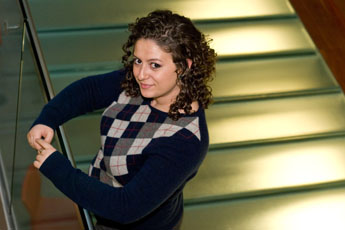
When Anisa Myzaferi and her parents moved to Chicago from a battered Albania after the country's 1997 civil war, she knew hardly any English and nothing about engineering. Twelve years later, she is graduating from Northwestern as one of the few female electrical engineers in her class.
Her parents moved the family to Chicago to provide a good-quality education for their daughter and to join her uncle, who had already settled in Old Irving Park on the city's northwest side.
"My father had a construction company back in Albania, and my parents are both engineers, and they both had a very good life, and they dropped it all to come here for me, so I knew I wanted to go to an important institution," Myzaferi says of her decision to attend Northwestern.
Following a family line of engineers and mechanics, Myzaferi concentrated her electrical engineering study in solid state, which focuses on nanotechnology, optoelectronic devices, lasers and other "cool stuff," Myzaferi says.
She employed her skills in electronics for the Northwestern Society of Automotive Engineers' Mini Baja team, which builds an off-road vehicle to compete in rough-terrain races against other schools in the Midwest region. She also helped enlist the Ford Motor Co.'s renewal of its $5,000 annual team sponsorship.
Myzaferi, one of the undergraduates in the graduate student organization Female Researchers in Electrical Engineering and Computer Science, also served as the liaison with Northwestern engineering graduates as the Society for Women Engineers' alumni chair. She organized industry shadowing and mentoring events and helped with various other SWE events such as Career Day for Girls, a one-day program to educate Chicagoland female high school students about career opportunities in engineering and applied sciences.
During the summer after her junior year, Myzaferi started doing research with Manijeh Razeghi, Walter P. Murphy Professor of Electrical Engineering and Computer Science and director of the Center for Quantum Devices, on X-ray diffraction characterization and structural analysis of semiconductor wafers. She plans to return to the center after graduation and pursue a doctorate in electrical engineering at Northwestern.
Looking to explore various defense technologies, including detection devices and infrared imaging cameras, Myzaferi says she would like to help innocent civilians protect themselves during attacks. She also hopes improved defense technologies would deter attackers.
Myzaferi still remembers hiding in her home in Vlora, Albania, as an 11-year-old, listening to the gunshots outside and nervously anticipating that one of the gunmen would march in at any moment. After living through Albania's civil conflict and witnessing the violence inflicted on her neighbors, Myzaferi says she wishes to save other children from the same experience.
"I feel maybe I went through all of that so that I could have the passion that I have for what I want to do," she says. "That's my drive."
— Sisi Tang (J11) |
